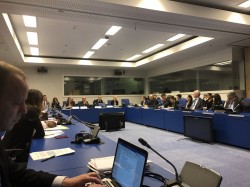Offering solutions to the world’s effort against crime
The PROTON project, its methodology and objectives where the focus of a dedicated side event of the 2018 Ninth session of the Conference of the Parties to the United Nations Convention against Transnational Organized Crime. The conference took place in Vienna (Austria) from the 15th to the 19th of October 2018. The side event was entitled “Changing Organized Crime: Lessons from EU Project PROTON” (see the flyer: https://www.projectproton.eu/wp-content/uploads/2018/09/flyer-PROTON-21092018.pdf). It was organised by the Programme against Serious and (Transnational) Organized Crime of the United Nations Office on Drugs and Crime (UNODC), with the support of Transcrime, the Joint Research Centre on Transnational Crime of Università Cattolica del Sacro Cuore in Milan (Italy) and co-sponsored by the Permanent Mission of Italy. Ernesto Savona, Director of Transcrime and Coordinator of PROTON, was among the speakers. The Conference of the Parties is organised on a biennial basis and it brings together representatives of the UN Member States signatories of the United Nations Convention against Transnational Organized Crime (UNTOC). The Convention was adopted by UN General Assembly resolution in 2000 and it serves as an international instrument in tackling criminal activities on a global scale. The goal of the Conference of the Parties is to boost the effectiveness of the measures and interventions adopted by Member States. The main objective of PROTON’s side event was to consider the main question “is the UNTOC Convention still an adequate instrument for combatting OC in its future developments?”. In order to best address the question, the side event was divided into three parts: “Transformations of traditional Organised Crime in the last 30 years: the Italian case”, “Hypotheses about the future of Organised Crime” and “Implications for UNTOC Convention”. These were preceded by an introduction by Karen Kramer (UNODC and partner to PROTON), who outlined PROTON’s different steps and pointed out how policymakers could use its results to address appropriate policies and mitigate the recruitment of new members in organised criminal groups. Ernesto Savona addressed, in the first presentation, the issue of transformations of traditional organised crime and how these could be interpreted. He also added in the second presentation some hypotheses on the future of organised crime. Antonio Balsamo, legal advisor of the Permanent Mission of Italy to the International Organizations in Vienna, noted how the combating of Italian organised crime could be a good example for other countries. Ugljesa Zvekic (Global Initiative) introduced the relevant issue of diversification of organised crime and the need to consider this in the future of the UNTOC, while looking for more coordination with the United Nations Convention against Corruption. A Q&A session with the audience followed, showing a great interest for PROTON and its developments. Karen Kramer concluded the event by inviting PROTON’s Coordinator to the UN Crime Commission to present the final results.
Keywords
organised crime, psychology
Countries
Austria



